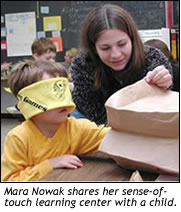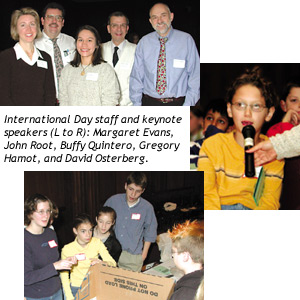| 

Sparking
Curiosity, Engaging the mind
 If
the recent exhibit of science learning centers developed by
Iowa education students is any indication, elementary school
science education is alive and well. For two days in October,
over 100 undergraduate education students showcased their
science instruction ideas to each other and guests. The students
designed the hands-on activities to intrigue and educate youngsters
about a variety of scientific problems, principles, and methods.
The event marked the seventh semester the College has hosted
the science education fair. If
the recent exhibit of science learning centers developed by
Iowa education students is any indication, elementary school
science education is alive and well. For two days in October,
over 100 undergraduate education students showcased their
science instruction ideas to each other and guests. The students
designed the hands-on activities to intrigue and educate youngsters
about a variety of scientific problems, principles, and methods.
The event marked the seventh semester the College has hosted
the science education fair.
“Most
of us remember sitting through classroom lectures that bombarded
us with scientific facts,” says Lecturer Susan Everett
(BA ’94/MS ’97/PhD ’99), who has taught
the Methods of Elementary School Science course for seven
years. “Most of us don’t remember much from that
kind of approach. Today, effective science teachers go for
a larger conceptual understanding of science that children
can learn, retain, and apply.”
That process
of lifelong, conceptual understanding begins early and is
best developed through hands-on activities that spark curiosity
and engage the mind. The displays presented by Everett’s
students did both. Mandy Conklin’s project invited participants
to predict whether various kid-friendly objects—Lego
pieces, pasta, a cherry tomato—would sink or float through
a three-layered concoction of corn syrup, green-tinted water,
and oil. Far from a dull presentation about mass and volume,
the exhibit taught the lesson by challenging students to predict
where they thought each item would “land” in the
liquid-filled beaker.
Another
eye-catching exhibit encouraged elementary school children
to create a character profile of a crime victim.
“Good
scientists develop and apply the same skills as good detectives,”
says junior elementary education major Rianna Furne. “Both
need to be observant, intelligent, patient, analytical, and
logical.”
Everett
says this showcase is a great way to get education students
to put into effect what they’ve learned about how to
teach science. “And it’s fun,” she said,
“for the students as well as the youngsters who come
‘try out’ the displays.” –by Jean
Florman

International
Day: our Human Right to a Healthy Environment
 Last
fall, 260 fifth- through 12th-grade eastern Iowa students
attended the College of Education’s sixth annual International
Day conference. The schoolchildren attentively listened to
keynote speaker, former state legislator and associate professor
of occupational and environmental health, David Osterberg,
discuss the topic of global climate change. They learned about
alternative energy sources such as wind power and what northern
European countries are doing to reduce this problem from Osterberg’s
experiences on his solar-powered bicycle as part the Green
Bike Tour. Last
fall, 260 fifth- through 12th-grade eastern Iowa students
attended the College of Education’s sixth annual International
Day conference. The schoolchildren attentively listened to
keynote speaker, former state legislator and associate professor
of occupational and environmental health, David Osterberg,
discuss the topic of global climate change. They learned about
alternative energy sources such as wind power and what northern
European countries are doing to reduce this problem from Osterberg’s
experiences on his solar-powered bicycle as part the Green
Bike Tour.
A
wide range of workshops engaged the students for a day—including
a hands-on activity of making solar-box ovens with John Root, Iowa
Renewable Energy Association board member committed to energy education;
learning about the role of the United Nations in protecting the
environment with Katy Hansen, director of the Iowa U.N. Association;
and discovering human rights, health, and the environmental issues
in countries such as Kenya, India, Mexico, and Kosovo.
With
Osterberg and the other conference presenters making these concepts
real for the students, some excellent questions were raised. “When
students ask, ‘what action can I take?’” Osterberg
said, “that’s the best question of all.”
To
learn more about the Green Bike Tour, visit 

|